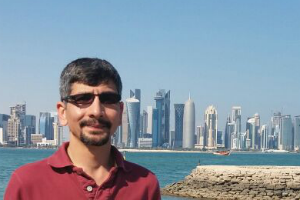Working life: My new life as a GP in Qatar

6.15 am
By the time I leave the apartment, the sun is high in the sky and the day has started for many. The warm autumn sun greets my face. It will only get warmer as the day goes on.
The journey to work takes just over half an hour as I take the dual carriageway, past the largest hospital in Doha and through six sets of traffic-lights.
6.50 am
I arrive at the brick and concrete health centre. The architecture is typical of the 21st-century cityscape, and a constant reminder I’m in a strange country. The contrast with the beautiful seaside county of Devon, where I worked as a GP for four years after finishing the GP training programme, could not be greater. While I do miss working in the UK, especially the surroundings, the nature of the bureaucracy and the ever-increasing, unnecessary administrative workload in the UK persuaded me to look out for alternatives.
I greet the staff as I walk the long corridor to our office, then scan my finger-prints on a machine outside the door to show I have arrived for work. I go to my clinic and start the computer.
In contrast to a regular day back at my Devon practice, there are no letters or X-ray reports lurking on my desk for signature, or even electronic lab reports or referrals, because I dealt with them the day before during clinic.
7.00 am
I see my first patient for the day, a young patient with viral illness, quickly followed by a middle-aged man who just requires a repeat prescription, and then a young adult who has a dry itchy patch of eczema on his foot but is not bothered about a wheeze in his chest, audible from a few feet away. I tried to convince him in my broken and inadequate Arabic that it needs examining and treating. After some discussion he agrees to my suggested course of action.
Later an adult male comes in with a cough and wants a sick note, a much sought-after piece of paper among adults and school age children here. He claims he is feeling generally tired and can’t go to work, but I explain that his illness does not warrant a sick note. He becomes annoyed and demands the note, but with the help of an interpreter I am able to get my point across. He leaves the room reluctantly because ‘the other doctors always gave me a sick note before’. I find this kind of attitude differs from what I experienced with patients in the UK, who tend to accept a rules-based explanation.
A tea boy pops his head in to check if I need a cup of tea or coffee.
1.00 pm
My morning clinic of 10-minute appointments becomes quieter in the afternoon, allowing me to catch up with paperwork.
My QAR 564,000 (approximately £100,000) per year contract commits me to approximately 40 hours a week for 45 weeks, plus 24 weekend days a year, including one in four weekends and a six or seven hour shift, depending on whether it’s in the morning or evening, with no overnight responsibilities, not to mention paid accommodation and utilities.
Our practice employs salaried GPs, with building, staff and overheads provided by the health authority. They also employ our practice nurses, reception and auxiliary staff, at no charge to us.
There is no list size to worry about, no visits, no LES, NES, DES, no commissioning, no federations and last but not least, no tax. I have better hours, more money and less stress than I had in the NHS I left just under a year ago. What’s not to like? Well, it’s true I do miss at times the more interactive communication I had with patients in the UK, and the coolish summers. Another caveat is that if you are based in centre with a large number of Qataris, you do need to know basic Arabic for a consultation. That’s not an issue if you are working in centres with a mostly expat population.
2.00pm
Clinic is over. I scan my finger prints to log out and make my way out of the building as the warm sun engulfs my body. I’ve forgotten how warm it is outside, due to the constant air conditioning indoors that sometimes makes me shiver with cold.
2.50 pm
I arrive home for a quick lunchtime snack and a nap, before I head down to the gym. I have the afternoon free, a big contrast with my working day in England which could easily stretch to 10-12 hours.
8.00 pm
I head out for dinner with friends in the souk, an old market place that bustles with expats and Qataris in the evenings. I have a lot more free time in Doha – I am learning to swim, I can go for walks on the seafront, or perhaps go to the Museum of Islamic Art, or even drive to Dubai (if the borders are open). I may come back to UK general practice in future because of its advantages, including patient involvement and my teaching passion, but in the meantime working in Doha is offering me some breathing space and helping to pay my mortgage off.
Pulse July survey
Take our July 2025 survey to potentially win £1.000 worth of tokens











